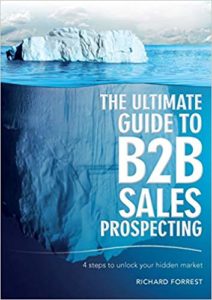I don’t know about you, but I personally love avocados.
I love them on toast. In salad. In salsa. On pizza. I even enjoy avocado ice cream.
I will only purchase avocados from Ted, the gentleman who owns and operates the local fruit and vegetable store near me–called, as you might guess, Ted’s–because he is an incredible salesperson. Ted knows anything and everything about his produce, and also sells from the standpoint of truth.
For example, I was in his store just last week, and picked out a couple of Hass avocados for a salad I was going to be preparing that evening. He handed me three Wurtz avocados and said, “Let me suggest you try these instead. It’s a winter variety from Bundaberg, and they’re especially nice this time of year.”
As usual he was right. Those avocados were perfect in my salad. This is why I always trust Ted–the qualities of a superior salesperson are totally embodied in him.
Is the sales art really disappearing?
As the digital environment constantly encroaches, there are some who argue that selling is a dying profession.
Some say that lead generation is now automated, and that order takers are the only sales staff we really need today.
People have done their research online by the time they engage with a company. They’ve got a good grasp on the technical specifications, benefits and features. They’re aware as well of competitors’ products and services.
Customers’ buying decisions are based on the information they’ve discovered on their own. Once made, they just want to place the order. They don’t really need salespeople any more.
So the argument goes.
The internet provides extraordinary benefits to organizations everywhere. It has streamlined the way customers research and buy products and services. It also enhances the ability of businesses to research and find customers.
In some instances, however, we can see that this has also encouraged lazy thinking and practice.
Senior executives have seen the volume of inquiries coming into their websites and often believe this is all they need.
It’s this attitude that can lead to businesses achieving only a fraction of their potential.
Great salespeople are still essential
Even with this increase in digital activity, salespeople still fulfill important functions in lead generation and most importantly in having ‘conversions.’
If your business, product or service isn’t number one or two in a specific market niche, prospective customers will likely miss it in their online research.
You need salespeople to engage prospects early and disrupt, to create awareness, contact new prospects, qualify them and direct them to your digital content and resources where they can learn more.
Another important sales function is building trust. After a customer has made a buying decision, they need to be reassured that their vendor of choice is reliable and trustworthy.
A professional salesperson will enhance the buying experience as they close the sale and take the order. They ensure the final purchasing process for the customer is easy, quick, hassle-free and enjoyable.
It’s also up to a salesperson to follow up and provide useful, relevant after-sales support, with the aim of securing a ‘customer for life.’
Salespeople connect
Salespeople provide what automated systems and online information cannot – a genuine human connection.
The business value of such connection should never be underestimated. At the end of the day, most people still prefer to buy from people they like.
Great salespeople are expert disrupters and identify and build rapport with prospects who have yet to submit an online request for information. They can help those people to clarify their needs and consider alternative solutions They speak with these prospects before they start doing their online research.
These salespeople make a huge difference to businesses in terms of customer acquisition and retention levels.
They differentiate their companies from others.
The competitive edge
Ultimately, great salespeople give businesses a tangible competitive edge, perhaps more so now than ever before.
Without salespeople, your solution is probably going to be commoditized. The only differentiation then will be price.
Whether you’re selling cars, consulting services or even avocados, it’s a challenge to replicate the value of a personal relationship between a salesperson and a customer.
Just ask Ted.
Like Ted, great salespeople take pride in their specialist knowledge and skill.
They have the ability to establish genuine customer needs and preferences.
They qualify customers to ensure their products or services fulfil a genuine need.
They tell the truth, without fear or favor, in their customers’ interests.
They negotiate transactions that represent value – for both their customer and for their own business.
They serve as trusted advisors to their customers.
They build long-term relationships.
Great businesses need great salespeople.
Pipeliner CRM empowers salespeople to be truly great at selling. Get your free trial of Pipeliner CRM now.












Comments (1)
Awesome post. I Got some good idea by reading this topic. Great information thanks for sharing this post.